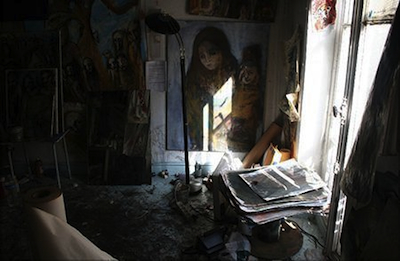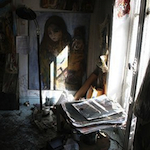Here’s part of another Featured Article from Cosmophilia, where you can read the whole piece. Author and hospice volunteer Kemp Battle poignantly reminds us that even the dying still belong here, with us — and if we can remain with them in their journey, they can teach us much. — Amanda P
by Kemp Battle
There is one fact none of us want to talk about. Not only do we not want to talk about it, we have collectively agreed to insist it is not even true: we are all dying. However robust our health, or confident our outlook, each of us is moving toward our own death every day. As the Buddhists say, we are all burning houses.

Photo by Eric Francis
How reluctant we are to acknowledge either smoke or flame! We rely on one another to act as if our lives are never-ending narratives. We cram our calendars with urgent tasks and hoard our grievances and triumphs as if they are meaningful. We demand the future will be a promise that must be kept, while on and on the noiseless clock ticks.
Each day, however, some learn that their life is coming to an end. In a doctor’s office or a hospital room or even in the stillness of their own homes, they are told that they can no longer pretend. They are thrown out of Eden into the pitiless world of visible time.
In that singular moment, at the start of the most momentous journey they will undertake since birth, something unexpected often happens — something worse even than the prospect of impending death. As the spontaneous laughter around them fades, as singing gives way to whispers or pity is offered instead of presence, it becomes clear that everyone around them is acting differently. Interest in what they might be experiencing is suffocated by newfound sorrow, concern and compassion from those around them.
And so, at the one moment common to all of humanity, they find themselves alone, banished from the tribe. They no longer belong.
How did this happen so fast? Who turned them out into this lusterless land of diminishing horizons?
We did.
Yes, us. We the very family, caregivers, friends who tend their afflictions with kindness, who offer them comfort and devotion. And how do we do it? We tell ourselves we cannot go where they are going and so we send them on alone. And we hold a prejudice so deep that we ourselves will not acknowledge it: we resent them.


As soon as I saw this piece I was grateful that this topic had been given a strong presence here. So thank you, Kemp, for this moving piece. And thank you, Eric, for including it.
What strikes a meaningful chord in me is the idea of treating the dying differently. I have seen this my whole life and it pains me greatly. When I was 18, my father developed a cancerous brain tumor and was given 6 months to live. Because it was the brain that was affected, my robust, masculine, backbone-of-a-father rapidly became very childlike in his actions. Whereas everyone else descended into baby talk and baby gesturing with him, I continued to talk to him as though he just got through plowing the field. There was already an unspoken — unSPEAKable, even — connection between us and I know this sensitivity to his condition was appreciated. His actual death was one of the most peaceful and inspiring moments I could have witnessed, taking with it any trace of fear in me that might have centered around death.
Since then, I myself have died many times. A literal beyond-the-body experience during the dark ages of HIV/AIDS took me to a place of fully understanding what exists beyond this realm is nothing but transcendent peace and support. My other deaths have been the removal of status and “who I think I am” via positions and accomplishments. The stripping away process was unpleasant — including the stripping of “friends” nowhere to be found thereafter — but without all that, I would truly be lost, lonely, tired, and sick today.
What you actually brought here, Kemp, is the key to life as I see it.
In appreciation –
Rob
Thank you for relating your story here, Rob, as well as on the Cosmophilia website — I think you’ve conveyed some thoughts and insights that bear exposure in both places. I know Amanda Moreno and I both agreed that Kemp’s piece brought a necessary missing piece to this puzzle of “belonging.”
I was not able to be physically present with my father at his actual moment of transition, but did get to spend time with him and we had important conversations in the weeks and days leading up to his death (also of cancer). i considered it quite a precious gift to be able to share as much of that journey with him as i did, and wish i had done so even more. it was eye-opening to witness both he and i accepting his dying, and making peace with that — rather than pretending it was not happening, or fighting against it.
and yes: the metaphorical deaths we endure in life are no less valuable to experience.
And thank you for sharing your experience here, Amanda. Further inspiration to embrace the chapters of death as a valuable journey.
Infinite thanks, Kemp, for submitting this piece, and to Rob and Amanda for your comments. Greeting death with grace and awareness and honesty, in whatever way it’s affecting us, is so important now.
This piece is so timely for me. I can’t thank you enough for this , Kemp (and for posting it dear Amandas!! And thank you for your comments, Rob and Amanda. I was immersed in mortality this weekend – staying with my recently widowed friend, while at the same time a health crisis erupted with my mother, who has dementia and is bedbound, and my father who is her main carer and increasingly frail. I was ready to drop everything and go to them – but miraculously was able to find a solution to the problem, and things are calm again for the moment.
What I observed this weekend is how grief is dealt with, or rather – not dealt with – much like death, as you describe, Kemp. I noticed how the community of people around my friend are amazingly supportive and present – but her recently deceased husband is never talked about – she’s never asked how she’s really feeling – and she clearly prefers it this way. So there’ was this social round of merrymaking and general jollity – as if the most important thing was to embrace life with gusto and get on with it – while just below the surface I perceived my friend’s immense, unspoken grief and anger, but there was no time for me to spend quietly alone with her. Then I got sick on Sunday, and had to stay and extra night – and that’s when my friend was really able to open up and communicate how she was feeling. Just yesterday I sent her an email, encouraging her to open up to her grief and let it cleanse and heal her. This whole experience made me come to terms with death to a certain extent – made me see how much death is part of life – and how important t is for those who have lost their loved ones to be held in a space where they are allowed to be sad, desperate and non-functioning without feeling alienated. It’s very good to be able to share this here. Thank you all. ((()))